
- Wood From Original
- Age
- Maker
- Aboriginal (4)
- Aborigine (3)
- African Artists (7)
- Akan (7)
- Compact (4)
- Dan People (6)
- Ethiopia Artisans (3)
- Hand Made (4)
- Handmade (14)
- Handwork (4)
- Heywood Wakefield (4)
- Hopi People (4)
- Junghans (3)
- Kimball (6)
- Lane (3)
- Lega People (3)
- Punu People (6)
- Skilled Craftsman (8)
- Unknown (102)
- Unsigned (6)
- ... (3958)
- Material
- Signed
- Tribe
- Type
GOERGES BRAQUE -OIL ON ORIGINAL CANVAS FROM THE 20s still life
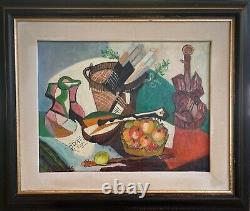
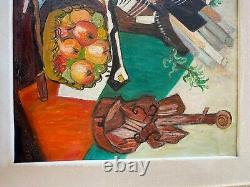
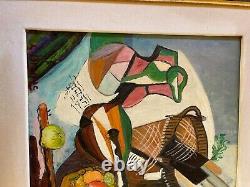
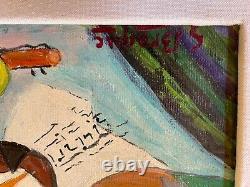



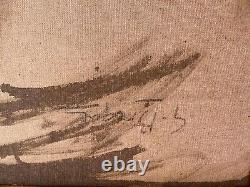
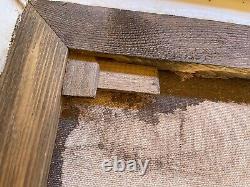
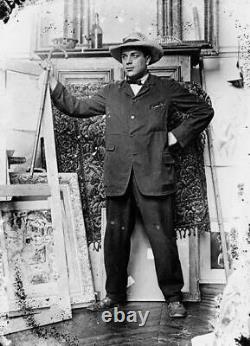


17.7 x 13.8" (45x35 cm) framed 26 x 22 x 1.6" (56x66x4 cm). (French, Argenteuil, May 13, 1882 - Paris, August 31, 1963). , oil on canvas, some stamp at back. Pablo Picasso and Georges Braque are considered the fathers of the Cubist movement, the two revolutionized the face of art. During the period from 1909 to 1912, the images of analytical cubism are characterized by their fragmentary appearance, a linear construction and the reduction of color to an almost monochromatic palette where the understanding of objects is done through basic geometric shapes and the use of multiple points of view.
Unlike other avant-garde images produced by the Italian Futurists, Piet Mondrian, or abstract art pioneer Wassily Kandinsky, the images of Analytic Cubism are left open to interpretation and are not accompanied by a manifesto claiming thought. For years, art historians and critics have been analyzing and attempting to come to grips with analytic cubism and account for its fragmentary, surface-heavy forms. Challenging the canons of creativity, Cubist artists wanted to revitalize art so that it was more in tune with innovations and the birth of the modern age. At the end of the 20th century, artists were in the midst of great changes; amidst technological advances, dramatic political and social changes characterized their period.For many artists, the creativity needed to reflect this burst of new energy and ideas and among them Pablo Picasso and Georges Braque, following the initial suggestion contained in the works of Paul Cezanne, rejected the rule of three-dimensionality and perspective in art and began to experiment with flat surfaces, reduction of form and color and the understanding of nature in basic geometric shapes. Attempting to create a sense of wholeness that reflected the need for the new, the two artists collaborated, communicated daily, and experimented in space, time, and representation of the world.
Space and its rules were disrupted by this period. Color fidelity of photos presented is not guaranteed.
Lack of a condition statement does not imply that a lot is perfect. This item is in the category "Art\Art Prints". The seller is "lechatnoir1881" and is located in this country: IT.- Artist: Georges Roualut
- Style: Abstract
- Material: oil
- Features: Framed, Signed
- Subject: Portrait
- Unit of Sale: Single-Piece Work
- Listed By: Dealer or Reseller
- Print Surface: Wood

